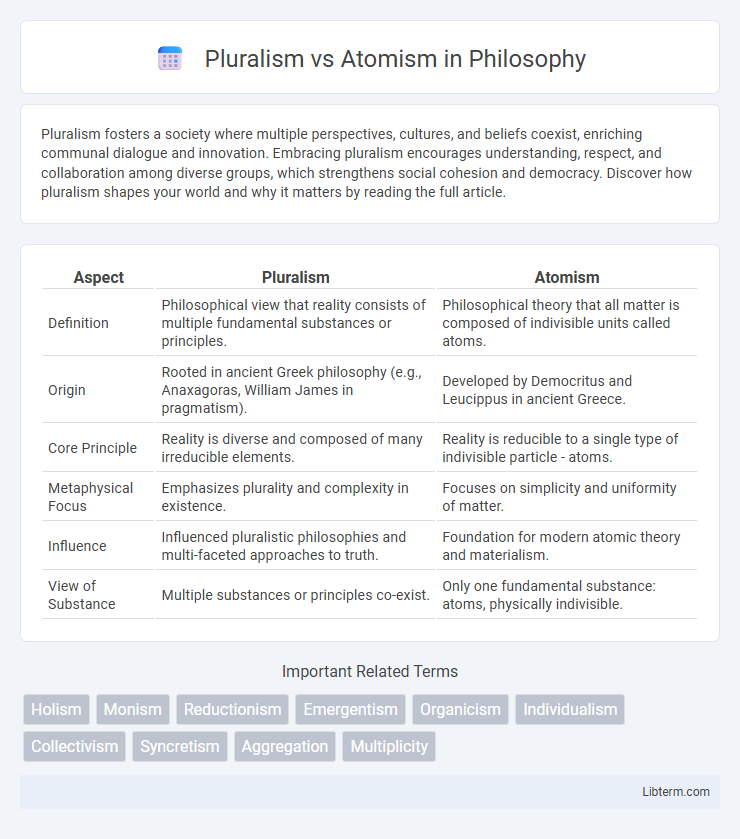Pluralism fosters a society where multiple perspectives, cultures, and beliefs coexist, enriching communal dialogue and innovation. Embracing pluralism encourages understanding, respect, and collaboration among diverse groups, which strengthens social cohesion and democracy. Discover how pluralism shapes your world and why it matters by reading the full article.
Table of Comparison
| Aspect | Pluralism | Atomism |
|---|---|---|
| Definition | Philosophical view that reality consists of multiple fundamental substances or principles. | Philosophical theory that all matter is composed of indivisible units called atoms. |
| Origin | Rooted in ancient Greek philosophy (e.g., Anaxagoras, William James in pragmatism). | Developed by Democritus and Leucippus in ancient Greece. |
| Core Principle | Reality is diverse and composed of many irreducible elements. | Reality is reducible to a single type of indivisible particle - atoms. |
| Metaphysical Focus | Emphasizes plurality and complexity in existence. | Focuses on simplicity and uniformity of matter. |
| Influence | Influenced pluralistic philosophies and multi-faceted approaches to truth. | Foundation for modern atomic theory and materialism. |
| View of Substance | Multiple substances or principles co-exist. | Only one fundamental substance: atoms, physically indivisible. |
Understanding Pluralism: A Foundational Overview
Pluralism embraces the existence of multiple, diverse realities or substances, emphasizing the complexity and variety inherent in the universe, contrasted with Atomism's focus on indivisible, fundamental units as the primary building blocks of all things. Understanding pluralism involves recognizing its foundational principle that reality cannot be reduced to a single substance or element, but instead comprises a multiplicity of interacting entities. This perspective shapes key philosophical debates in metaphysics, ontology, and epistemology by challenging monistic frameworks and advocating for a more nuanced, layered interpretation of existence.
Atomism Explained: Key Concepts and Origins
Atomism, originating with ancient philosophers Leucippus and Democritus, posits that all matter consists of indivisible units called atoms, which combine in various ways to form the observable world. This philosophy emphasizes the discrete, fundamental nature of atoms as eternal, indestructible particles moving through the void, explaining natural phenomena through the interactions and arrangements of these basic building blocks. Atomism contrasts with pluralism by rejecting the existence of multiple fundamentally different substances, instead asserting a unified material basis for all reality.
Pluralism vs Atomism: Core Philosophical Differences
Pluralism asserts that reality consists of multiple fundamental substances or principles, emphasizing diversity and complexity in the nature of existence. Atomism, in contrast, posits that everything is composed of indivisible units called atoms, reducing complexity to a single type of building block. The core philosophical difference lies in pluralism's acceptance of varied elements as foundational versus atomism's commitment to a uniform, minimal set of entities.
Historical Development of Pluralist and Atomist Thought
Pluralism and atomism originated in ancient Greek philosophy, with atomism primarily developed by Leucippus and Democritus, who proposed that the universe is composed of indivisible atoms moving in the void. Pluralist thinkers like Anaxagoras and Empedocles introduced the idea of multiple fundamental elements or forces, emphasizing diversity in the composition of reality. These foundational theories influenced later philosophical and scientific developments by framing debates on the nature of matter and the structure of the cosmos.
Influential Philosophers Shaping Pluralism and Atomism
Democritus and Leucippus are foundational figures in atomism, proposing that everything is composed of indivisible atoms moving through the void, influencing modern scientific materialism. In contrast, William James and Charles Sanders Peirce advanced pluralism by emphasizing the diversity of experiences and rejecting monistic interpretations of reality, shaping contemporary pragmatic philosophy. The interplay between these philosophies continues to impact metaphysics, ontology, and epistemology debates in the philosophy of science and mind.
Applications of Pluralism in Modern Society
Pluralism in modern society fosters inclusive governance by encouraging diverse cultural, ethnic, and ideological groups to participate in decision-making processes, thereby strengthening democratic institutions. It is applied in multicultural education, promoting curriculum diversity to reflect multiple perspectives and enhance social cohesion. Urban planning also benefits from pluralism by accommodating varied community needs and fostering equitable development.
The Role of Atomism in Scientific Inquiry
Atomism serves as a foundational principle in scientific inquiry by positing that complex phenomena can be understood through the behavior and interaction of fundamental, indivisible units called atoms. This reductionist approach enables precise measurement, experimentation, and modeling across disciplines such as physics, chemistry, and biology. By emphasizing discrete components, atomism drives the development of theories that explain macroscopic properties from microscopic structures, advancing empirical knowledge and technological innovation.
Pluralism in Politics, Ethics, and Culture
Pluralism in politics emphasizes the coexistence of diverse groups and interests within a society, promoting power-sharing and mutual respect among competing entities. In ethics, pluralism acknowledges multiple moral perspectives, rejecting absolute truths and encouraging dialogue to address complex moral dilemmas. Cultural pluralism recognizes the value of diverse traditions and identities, fostering inclusivity and the preservation of unique cultural expressions within a unified social framework.
Criticisms and Limitations of Pluralism and Atomism
Pluralism faces criticism for its potential to promote relativism, as it may struggle to establish a clear hierarchy of truths or values among diverse perspectives. Atomism is limited by its reductionist approach, often oversimplifying complex social or natural phenomena into individual components, thereby ignoring the holistic interactions within systems. Both theories can be criticized for inadequately addressing the dynamic interplay between parts and wholes, leading to incomplete or skewed interpretations in fields like philosophy, politics, and sociology.
Future Perspectives: Integrating Pluralism and Atomism
Future perspectives on integrating pluralism and atomism emphasize a synergistic framework that recognizes the value of diverse, interconnected entities alongside fundamental, discrete units. Emerging interdisciplinary research advocates for models combining pluralistic complexity with atomistic precision to enhance understanding in fields like quantum mechanics, social theory, and systems biology. This integration promises innovative approaches to resolving longstanding debates by leveraging both holistic and reductionist methodologies.
Pluralism Infographic

 libterm.com
libterm.com